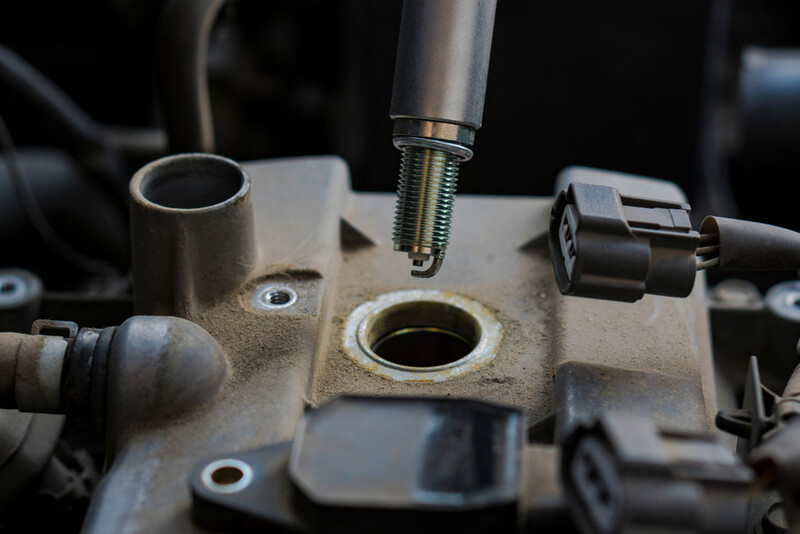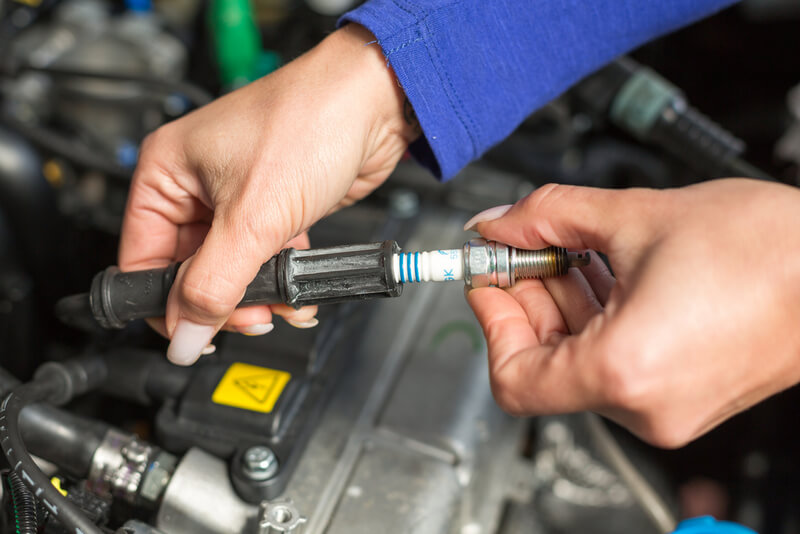
Despite the recent push for electric vehicles, we are still mostly relying on cars with internal-combustion engines. This type of engine combust gasoline or diesel fuel to produce power and move your vehicle forward. However, gasoline and diesel engines differ in the way they ignite the fuel. While diesel fuel ignites with pressure, gasoline ignites with the help of spark plugs. These small parts may seem insignificant, but they are essential for the smooth running of your engine. That said, spark plugs worn out with time and will need to be replaced at some point. Luckily, spark plugs don’t cost much, and you can even replace them with only basic tools and simple auto mechanics knowledge.
There are several reasons why you would want to replace the spark plugs in your car. The most obvious one is ensuring that the engine runs properly. During their usage, the plugs can get dirty and full of fuel combustion deposits. When spark plugs wear out, they can’t ignite the fuel properly, and you may feel a loss of power, encounter engine misfires and reduced fuel-efficiency. If you wait even longer, the engine will become rough at idle, risk stalling under load and even worse, it might not start at all. When it happens, the check engine light (CEL) might light up or start blinking on your dashboard.

You can easily prevent all of these issues by replacing the spark plugs on time. Spark plugs aren't free, of course. Nonetheless, you might spend even more money on fuel running your car around with old spark plugs in. Here's a couple of hints and advice to help you save money on spark plug replacement and ensure you get the most bang for your bucks.
Spark Plug Replacement Cost
Replacing the spark plugs on your car is often inexpensive. However, the total cost of the replacement will depend on various factors such as the type of spark plugs,the price of labor charged by your auto repair shop and the car model.
That being said, more expensive spark plugs usually perform better. More importantly, expensive plugs also last longer and might be more cost-effective in the long run. Down below are the most popular spark plug types and a description of how different factors can influence the total cost of your spark plug replacement.
Copper Spark Plugs
Copper spark plugs are the cheapest option on the market, starting at around $5 each. They use copper for the electrode and nickel-alloy for the ground electrode. The problem with these models is that they don’t last very long mostly because the nickel-based alloy is soft and wears out quickly.
The highest-quality copper-based spark plugs last around 25,000-miles. In other words, even though they are cheap to buy, you’ll be replacing them more frequently.
That said, copper models are still useful for performance engines. Thanks to the excellent heat dissipation, the chances of misfiring with these spark plugs are meager. Also, copper models are useful on older engines with a low-voltage distributor-based ignition system. They don’t work very well with high-voltage distributor-less ignition systems, though.

Platinum Spark Plugs
Platinum is a much more expensive metal than a nickel-based alloy. Consequently, plugs made of platinum tend to cost a little bit more (around $10). In these models, the platinum is used instead of the nickel-alloy for the ground electrode. Platinum is also harder and more durable than nickel-based alloys. Platinum plugs should last for at least 50,000-miles, and some even go up to 80,000-miles.
Generally, platinum spark plugs have worse heat dissipation than copper models. That quality makes them useful for modern fuel-efficient engines with a high-voltage distributor-less ignition system. That said, high-performing engines that work with “colder plugs” might not work well with platinum models. Nonetheless, we recommend checking the owner’s manual to see if the manufacturer recommends platinum plugs. If the answer is yes, then you shouldn’t use copper plugs in your motor.
One some new vehicles, manufacturers recommend using double-platinum models. These plugs use platinum on both electrodes and generate two sparks. Don’t worry, the second spark happens during the exhaust cycle and won’t ignite any fuel.

Iridium Spark Plugs
If money is not a concern, we recommend going for iridium spark plugs (over $10 for basic versions). These models are the most expensive ones due to the higher price of iridium compared to platinum or nickel-alloy. That said, iridium is also harder than both platinum and nickel-alloy, which makes these plugs extremely durable.
The best iridium models on sale today last up to 100,000-miles. In other words, you might be paying more to replace these plugs, but you won't need to replace them in the next 6-7 years, depending on your annual mileage.
Many modern cars require the use of iridium spark plugs. If that’s the case with your vehicle, we strongly recommend replacing them only with iridium ones. Engines designed to work with iridium plugs won’t work as efficiently with platinum or copper plugs. That said, you can put iridium models in almost every motor and rip the durability benefits.
Vehicle Model
Not all cars are created equal and that also applies to spark plugs. Some vehicles have different engine configurations that might make it a lot harder to reach and replace the spark plugs. If you own a car equipped with a flat-four engine, like a Subaru Impreza for example, the plugs are located on either side of the engine, between the engine and the wheel well. In that case, there's limited space to work and removing the plugs and reinstalling them will take a lot more time than on a conventional inline-four engine.
Another good example is cars powered by a V-engine. On this type of engine configuration, it's not uncommon for one of the engine head to be covered by the intake manifold. In this case, the intake manifold will have to be removed to allow access to the spark plugs on that specific head. Hyundai Sonata 3.3L V6 and Dodge Caravan V6, just to name a few, are built that way and will require more time to perform the spark plug replacement, thus increasing the total labor cost.
Obviously, the number of cylinders also has an impact on the total cost of the replacement. An inline-four engine only requires 4 plugs while a V8 will require 8. Vehicles equipped with dual-ignition systems like 1989 Ford Ranger and more recent Honda Fit equipped with the i-DSI system, will require 2 spark plugs per cylinder.
Where to Get Spark Plugs Changed?
Replacing the plugs in your car is very straightforward – any mechanic could do it. If your vehicle is still under warranty, you don't especially have to have the plugs replaced by your dealer. No matter whether your car is under warranty or not, you are always allowed to choose your auto repair shop. However, if you choose not to do business with your accredited dealer, make sure to replace your plugs with the recommended ones and keep all maintenance invoices at all times. Doing so will prevent your dealer from voiding your warranty if something happens with your engine further down the road.
Some people will prefer to only have their dealer work on their car and there's obviously some benefits in doing that. When all your maintenance is performed by the same dealer, they'll have a record of your maintenance history in their system and can even remind you when it's time to replace specific components. It's also easier to have your warranty honored since they already have all the invoices and proof of maintenance in hand. However, it's important to mention that car dealers often charge a higher labor rate and OEM parts also cost more.
If your vehicle is not under warranty anymore, we recommend going to a trustworthy independent auto repair shop. The quality of work would probably be the same, yet the price will be much lower. Independent auto mechanics charge around 30-40% less than dealerships.
Finally, you can also replace the spark plugs by yourself. This way, you’ll cut on the cost of labor and only pay for the spark plugs.
How Long Does It Take to Replace Spark Plugs?
It all depends on how many plugs your engine has and how easy it is to reach them.
With that being said, if you have the right tools for the job, it should take from 30 minutes to 2 hours. On most inline-four engines, you only need to remove the coil-on plugs or spark plug wires and unscrew the plugs. More recent vehicles, however, will often require the removal of other components to allow access to the plugs.
Obviously, the more cylinders, the more time it takes to replace the spark plugs.
When in doubt, take a look inside your vehicle's repair manual to have a better idea of the flat replacement time suggested by the manufacturer. Needless to say that these flat times are calculated for certified auto mechanics. If you are a beginner, expect the replacement to take as much as twice the time.
Better safe than sorry!

How Much Does It Cost to Replace 4 Spark Plugs?
Let’s do the math considering everything that we’ve learned until now. The price of 4 spark plugs is around $20 to $100, depending on the material used. That is how much you’ll pay if you do the work yourself.
If you want to go to a dealership, the cost of labor ranges from $100 to $150. The price of the plugs might also be higher at the dealership, but not by much. Usually, you will pay from $120 to $250 to change the plugs at a certified dealership.
If you decide to go with an independent repair shop, the cost of labor will range from $60 to $100. Add that to the price of the plugs, and you’re looking at $80 to $200 total.
To Wrap It Up
The cost of replacing spark plugs might often seem high only to keep your engine running but keep in mind that not replacing them might even cost you more money. Underperforming spark plugs will significantly reduce your car's fuel-efficiency and may cause damage to other internal components. When spark plugs don't properly burn all the fuel contained in the combustion chambers, the fumes will accumulate and may clog your catalytic converter. Not to mention that once your engine stalls, you'll also need to have it towed to the nearest auto repair shop. Replacing a catalytic converter or the cost of a tow truck will easily exceed the cost of a quick spark plugs replacement.
Never forget that omitting to keep your car well-maintained is rarely worth it in the long run.
